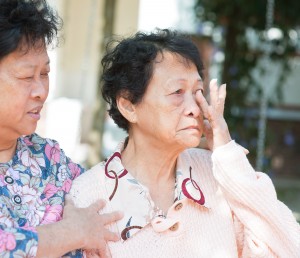
By B. Rose Huber, Woodrow Wilson School of Public and International Affairs
Mothers – but not fathers – exhibited symptoms of depression and experienced declines in overall health after the death of an adult son, while the death of a daughter had no such effect on either parent, according to one of the first studies to examine the impacts of the death of an adult child on parents aged 65 and older.
In East Asian cultures, an adult son’s role in the family is crucial to the wellbeing and financial stability of his parents, the researchers suggest. Therefore, a traumatic event, like the death of a son, could place quite a strain on elderly parents living in these cultures – particularly women, especially if the deceased son is the eldest or only son.
The researchers, from the Office of Population Research in Princeton University’s Woodrow Wilson School, published their findings in the journal Social Science & Medicine based on data from the Taiwanese Longitudinal Study of Aging, a nationally representative survey designed to assess the health of older people in Taiwan.
“In East Asian cultures like Taiwan, sons hold the primary responsibility for providing financial and instrumental assistance to their elderly parents,” said lead author Chioun Lee, a Princeton postdoctoral research associate. “Older women who have had particularly few educational and occupational opportunities are more likely to rely on their sons for support. Therefore, a traumatic event, like a son’s death, could place quite a strain on a mother’s health.”
Along with study coauthor Noreen Goldman, the Hughes-Rogers Professor of Demography and Public Affairs at WWS, and researchers from Georgetown University, Lee used data collected for the Taiwanese Longitudinal Study of Aging from 1996 to 2007, which included approximately 4,200 participants.
To evaluate parental wellbeing, they used two self-reported measures: one for overall health and another for depressive symptoms. Each respondent’s health was assessed based on the following question: “Regarding your current state of health, do you feel it is excellent, good, average, not so good, or poor?” The items were coded on a one-to-five-point scale with higher scores indicating better health. Past studies have indicated that this measure is a strong predictor of mortality.
Depressive symptoms were measured with an eight-item subset of the Center for Epidemiological Studies Depression Scale, which asks participants to report how often they’ve experienced various situations or feelings in the past week. Possible answers range from “0,” which means rarely or none of the time, to “3,” which is most or all of the time. Higher scores for the eight items indicate more frequent depressive symptoms.
The researchers controlled for parental wellbeing prior to the death of a child and analyzed the data in two stages. First, they tested the extent to which a child’s death affected a parent’s health and then whether that varied by the parent’s sex. Finally, they determined the influence of a deceased child’s sex on parental wellbeing.
They found that women who lost a son scored, on average, 2.4 points higher on levels of depressive symptoms than those who did not lose a child. For men, there were no significant differences. There was no evidence to suggest that either mothers or fathers were significantly affected by depressive symptoms or declines in reports of overall health following the death of a daughter. Lee explains that while finances are a concern, there may be other factors at play.
“I also think that various attributes of deceased children, such as birth order, affective bonds with their parents or cause of death, might influence parental wellbeing,” said Lee, who is a native of Korea and observed son preference and gender inequality throughout her childhood.
According to Goldman, these findings underscore the continued gender inequality in Taiwan.
“Despite large advances in women’s labor market participation and educational attainment in recent years – for example, women in Taiwan are now more likely than men to hold a higher education degree – son preference persists, affecting various aspects of women’s well-being,” Goldman said.
Lee, C., et al., Death of a child and parental wellbeing in old age: Evidence from Taiwan, Social Science & Medicine (2013), http://dx.doi.org/10.1016/jsocscimed.2013.08.007
The work was funded by the Demography and Epidemiology Unit of the Division of Behavioral and Social Research at the National Institute on Aging and the Eunice Kennedy Shriver National Institute of Child Health and Human Development.


You must be logged in to post a comment.